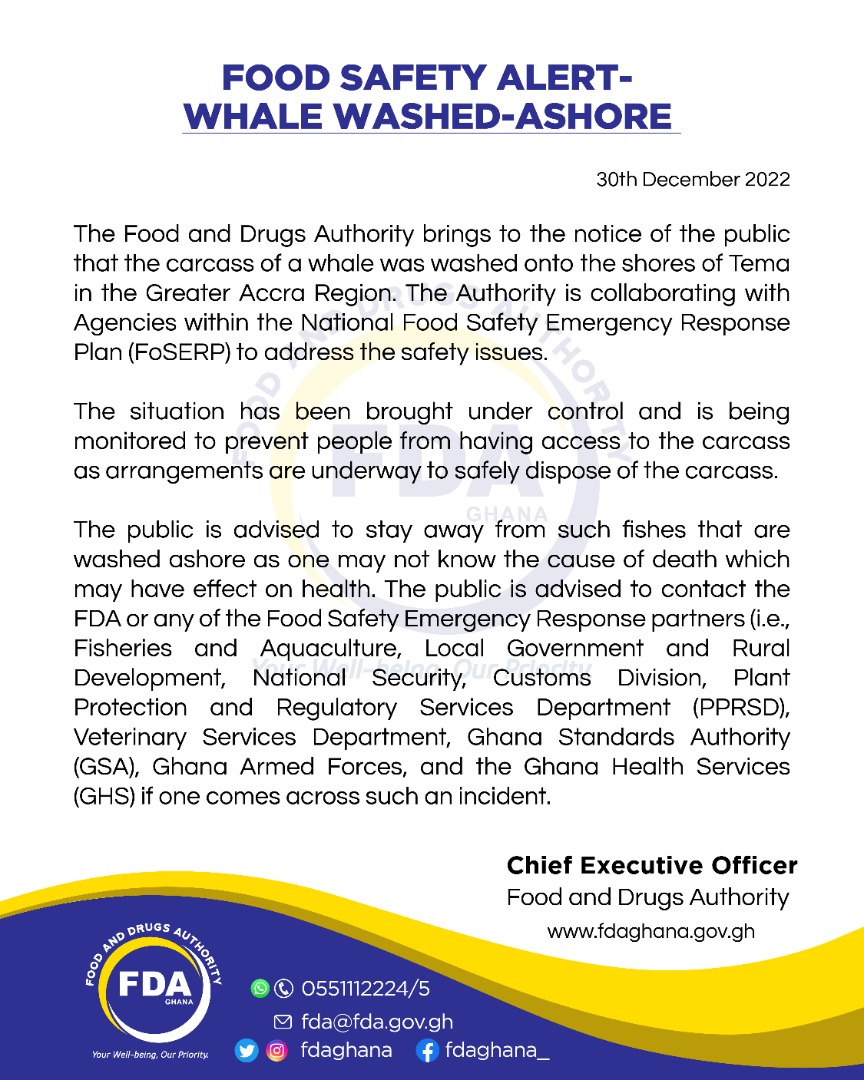
Tema: Dead whale washes ashore, FDA cautions public against consumption
The Food and Drugs Authority (FDA) has cautioned the public against consuming the carcass of a whale, which was washed onto the shores of Tema in the Greater Accra Region.
The Authority is collaborating with Agencies within the National Food Safety Emergency Response Plan (FoSERP) to address the safety issues.
Advertisement
According to the FDA, the situation has been brought under control and is being monitored to prevent people from having access to the carcass as arrangements are underway to safely dispose the carcass.
"The public is advised to stay away from such fishes that are washed ashore as one may not know the cause of death which may have effect on health," the FDA said in a public alert notice.
The public is advised to contact the FDA or any of the Food Safety Emergency Response partners (i.e., Fisheries and Aquaculture, Local Government and Rural Development, National Security, Customs Division, Plant Protection and Regulatory Services Department (PPRSD), Veterinary Services Department, Ghana Standards Authority (GSA), Ghana Armed Forces, and the Ghana Health Services (GHS) if one comes across such an incident, it added.
The Food and Drugs Authority brings to the notice of the public that the carcass of a whale was washed onto the shores of Tema in the Greater Accra Region.
The Authority is collaborating with Agencies within the National Food Safety Emergency Response Plan (FoSERP) to address the safety issues.
The situation has been brought under control and is being monitored to prevent people from having access to the carcass as arrangements are underway to safely dispose of the carcass.
The public is advised to stay away from such fishes that are washed ashore as one may not know the cause of death which may have effect on health.
The public is advised to contact the FDA or any of the Food Safety Emergency Response partners (i.e., Fisheries and Aquaculture, Local Government and Rural Development, National Security, Customs Division, Plant Protection and Regulatory Services Department (PPRSD), Veterinary Services Department, Ghana Standards Authority (GSA), Ghana Armed Forces, and the Ghana Health Services (GHS) if one comes across such an incident.
Dangers of handling and consumption of washed-ashore dead fish
The Food and Drugs Authority’s attention (FDA) has been drawn to a video showing the carcass of a whale washed ashore at Tema in Greater Accra. Voices can be heard expressing using such fish for food.
It is not strange to sometimes find fish washed up on the shores of beaches. There are many factors that contribute to dead fish on the shores; pollution of waters, natural predators, and increasing warm levels of the water that cause suffocation of the fish and lead to their death.
The consumption of dead seafood washed ashore must be approached with caution as the cause of death of the fish may adversely affect the health of the consumer.
When fish dies through chemical poisoning, the chemical in question can be passed on to the consumer or converted into a more toxic chemical during preparation (i.e., cooking, smoking, frying, etc.) of the meal which then causes food poisoning in the consumer.
It must also be noted that if the death of fishes is caused by zoonotic pathogens (i.e. a germ that is able to cause disease in both animals and human beings), consumers of that fish are likely to face the same fate as the fish. Zoonotic diseases are illnesses that can be transferred from animals to humans.
Most zoonotic diseases in fish are caused by bacterial infections and can be transmitted to humans via direct contact with both live or dead fish. This effect ranges from mild to severe which may sometimes result in death.
With these infections, the food handler can get infected through skin lesions while handling the fish. This means infection may not even require the consumption of the fish. Again, dead fish deteriorates very rapidly when exposed to heat and ambient weather conditions. Deteriorating fish has been known to cause severe cases of food poisoning.
Although whale meat has been proven to be edible, recent studies have shown that whales carry a lot of mercury in their bodies due to their feeding on large amounts of smaller fish. The highest allowable average concentration for mercury in humans is 0.46 microgram /gram per week whereas the mercury levels in the liver of whales are 370 micrograms /grams, which is an indication of the concentration of mercury in the body of the whale.
Thus, the safety of whale meat for consumption by humans cannot be guaranteed.
Mercury poisoning causes tremors, headaches, difficulty sleeping, impaired sensations, kidney damage, and breathing difficulties.

Writer's email: [email protected]



